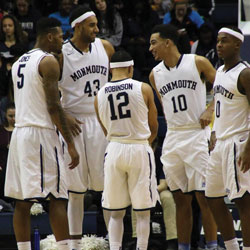Student-athletes are multifaceted individuals who have passion, love, dedication, and motivation for the sport they play, and all the work that comes along with it. People often overlook the responsibilities that athletes have, on and off the court. Whether it is soccer, lacrosse, football, basketball, field hockey, golf, or bowling, each student program and team has rules and demands that athletes have to obey. These students also have the pressure of representing their team and Monmouth University.
Senior communication student, Justin Robinson, guard on the men’s basketball team, said, “We have a whole bunch of things that people don’t notice. We have to sit in the front rows of classes, or else we get in trouble. We have to carry ourselves a certain way because everything we do is watched under a microscope. Things that a regular student could get away with, we can’t because we’re athletes.” Robinson continued.
“It’s demanding, but I love it and wouldn’t change it for anything.”
Athletes are a symbol for Monmouth, and they have to strive in the classroom and on the court. There are no easy days for them. They are always asked for more than a student who is not involved in sports programs.
Lacrosse senior midfielder and communication student, Kevin Osback, said, “The team comes first, long practices followed by film sessions and lifting sessions. Applying a championship mentality to every aspect of the day from the little things to the bigger picture.”
Student-athletes are motivated to win and practice every single day to reach their goals. They have practices in the morning, during the days, and sometimes later on in the evening. Practice makes perfect, and practice puts Monmouth up on the charts against other universities.
Specialist professor of communication, Matthew Harmon, commented, “No question, student-athletes are challenged because of time constraints that they have between class, practice, games, or even just trying to enjoy being a college student.”
“Other students have challenges also–many work and have to balance that out. I would think one of the bigger challenges for student athletes is when they have to travel for games and could be away for few days.” Harmon said.
Football senior linebacker and health studies student, Payton Minnich, said, “Living as an athlete means that you are judged a little more than everyone, whether it be by coaches, professors, or your friends and family.”
Minnich continued, “There is always someone hoping for your downfall. My motivation is proving them wrong. It is the best feeling when people doubt you or the team, and we win. Nothing beats that.”
If you play a sport at Monmouth, everyone knows. It comes with a great deal of pressure. Making sure all homework is completed, grades are decent, study hall hours are met, practices count, and the games are won. A student athlete’s life consists of studying, class, practice, and games, while trying to take advantage of the college experience.
In the University handbook, the Athletics Department Mission Statement reads, “Monmouth University is committed to Athletics as an integral part of higher education. Athletics must provide student-athletes with the opportunity to develop their highest level of athletic ability, while safeguarding their welfare, on and off the field of competition in a diverse environment that promotes high academic standards and personal development.”
Monmouth has student-athletes’ best intentions in mind. They want students to strive on and off the field. Monmouth knows the stress that comes along with having a busy schedule, and they are here to help students perform to the best of their abilities. There are tutors available for athletes if they feel like they are falling behind, or just need extra help. Athletes’ grades are just important as the scoreboard.
Being an athlete is not easy. Once a student puts on a jersey, they are not only representing themselves, but the school, the program, their coach, and their team as a whole. They have to watch what they say or do. If a team gets in trouble from one person, they all suffer and take the heat together. There is no ‘I’ in team. They have to work together, practice together, and they become a family.
People do not know the demands of a program. As long as the athlete loves the sport of their choosing, after a while the lifestyle becomes their reality. They live for game days, where they are able to perform to the best of their abilities, and get the W for Monmouth University.
IMAGE TAKEN from facebook.com




